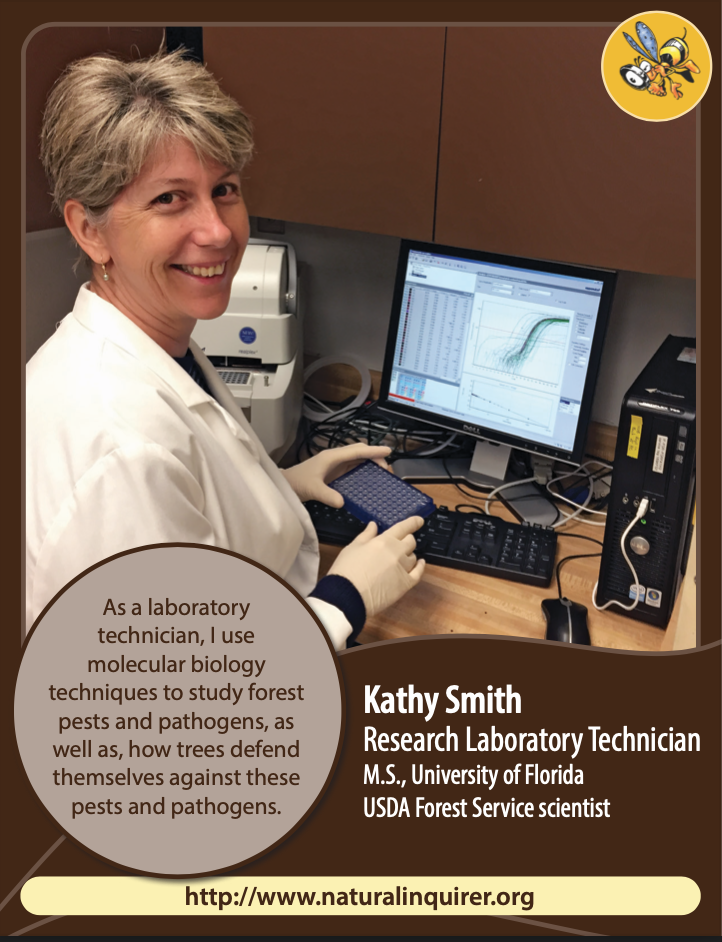Forests & Plants


Kevin T. Smith, Plant Physiologist

- Ph.D., University of Georgia
- Forest Service Scientist
- As a plant physiologist, I study how plants and fungi capture energy, grow, protect themselves, and eventually die. I also study beneficial microorganisms in the forest.
- Ph.D., University of Georgia
- Forest Service Scientist
- As a plant physiologist, I study how plants and fungi capture energy, grow, protect themselves, and eventually die. I also study beneficial microorganisms in the forest.


Kathy Smith, Research Laboratory Technician

- M.S., University of Florida
- USDA Forest Service Scientist
- As a laboratory technician, I use molecular biology techniques to study forest pests and pathogens, as well as, how trees defend themselves against these pests and pathogens.
- M.S., University of Florida
- USDA Forest Service Scientist
- As a laboratory technician, I use molecular biology techniques to study forest pests and pathogens, as well as, how trees defend themselves against these pests and pathogens.


Nick Skowronski, Forest Ecologist

- Ph.D., Rutgers University
- USDA Forest Service Scientist
- A forest ecologist studies how plants and animals interact within a forest community. Some of these scientists are particularly interested in how forests cycle carbon and work to measure how carbon moves through these systems.
- Ph.D., Rutgers University
- USDA Forest Service Scientist
- A forest ecologist studies how plants and animals interact within a forest community. Some of these scientists are particularly interested in how forests cycle carbon and work to measure how carbon moves through these systems.


Callie Schweitzer, Research Forester

- Ph.D., Penn State University
- USDA Forest Service Scientist
- A research forester studies how forests respond to disturbances. I am interested in trying to predict how trees grow, which tree species grow best, and how both plants and animals respond to events such as fire, drought, timber harvesting, and people!
- Ph.D., Penn State University
- USDA Forest Service Scientist
- A research forester studies how forests respond to disturbances. I am interested in trying to predict how trees grow, which tree species grow best, and how both plants and animals respond to events such as fire, drought, timber harvesting, and people!


Michael Schwartz, Conservation Geneticist

- Ph.D., University of Montana
- USDA Forest Service Scientist
- A conservation geneticist examines the DNA found in cells of every species to learn many secretive facts about these species.
- Ph.D., University of Montana
- USDA Forest Service Scientist
- A conservation geneticist examines the DNA found in cells of every species to learn many secretive facts about these species.


Paul Schaberg, Research Plant Physiologist

- Ph.D., University of Vermont
- USDA Forest Service Scientist
- A plant physiologist studies the biology of how plants work. These studies are often done to determine if a part of a plant is not working or is causing the plant problems. An example includes low air temperatures causing injury and poor growth.
- Ph.D., University of Vermont
- USDA Forest Service Scientist
- A plant physiologist studies the biology of how plants work. These studies are often done to determine if a part of a plant is not working or is causing the plant problems. An example includes low air temperatures causing injury and poor growth.


Lindsey Rustad, Forest Ecologist

- Ph.D., University of Maine
- USDA Forest Service Scientist
- A forest ecologist studies the interrelated patterns and processes of vegetation, animals, energy, water and nutrients in forests.
- Ph.D., University of Maine
- USDA Forest Service Scientist
- A forest ecologist studies the interrelated patterns and processes of vegetation, animals, energy, water and nutrients in forests.


Alejandro Royo, Ecologist

- Ph.D., University of Pittsurgh
- USDA Forest Service Scientist
- Ecologists study how interactions among organisms within communities and environmental factors influence the diversity, distribution, and dynamics of species.
- Ph.D., University of Pittsurgh
- USDA Forest Service Scientist
- Ecologists study how interactions among organisms within communities and environmental factors influence the diversity, distribution, and dynamics of species.


Lara Roman, Research Ecologist

- Ph.D., University of California, Berkeley
- USDA Forest Service Scientist
- As a research ecologist, I study the ecology of trees in cities, towns, and suburbs.
- Ph.D., University of California, Berkeley
- USDA Forest Service Scientist
- As a research ecologist, I study the ecology of trees in cities, towns, and suburbs.


Kurt Riitters, Landscape Ecologist

- Ph.D., Oregon State University
- USDA Forest Service Scientist
- Landscape ecology differs from traditional ecology by including humans as a key component of ecosystems. We study how ecosystems are affected by human activities over very large regions.
- Ph.D., Oregon State University
- USDA Forest Service Scientist
- Landscape ecology differs from traditional ecology by including humans as a key component of ecosystems. We study how ecosystems are affected by human activities over very large regions.



